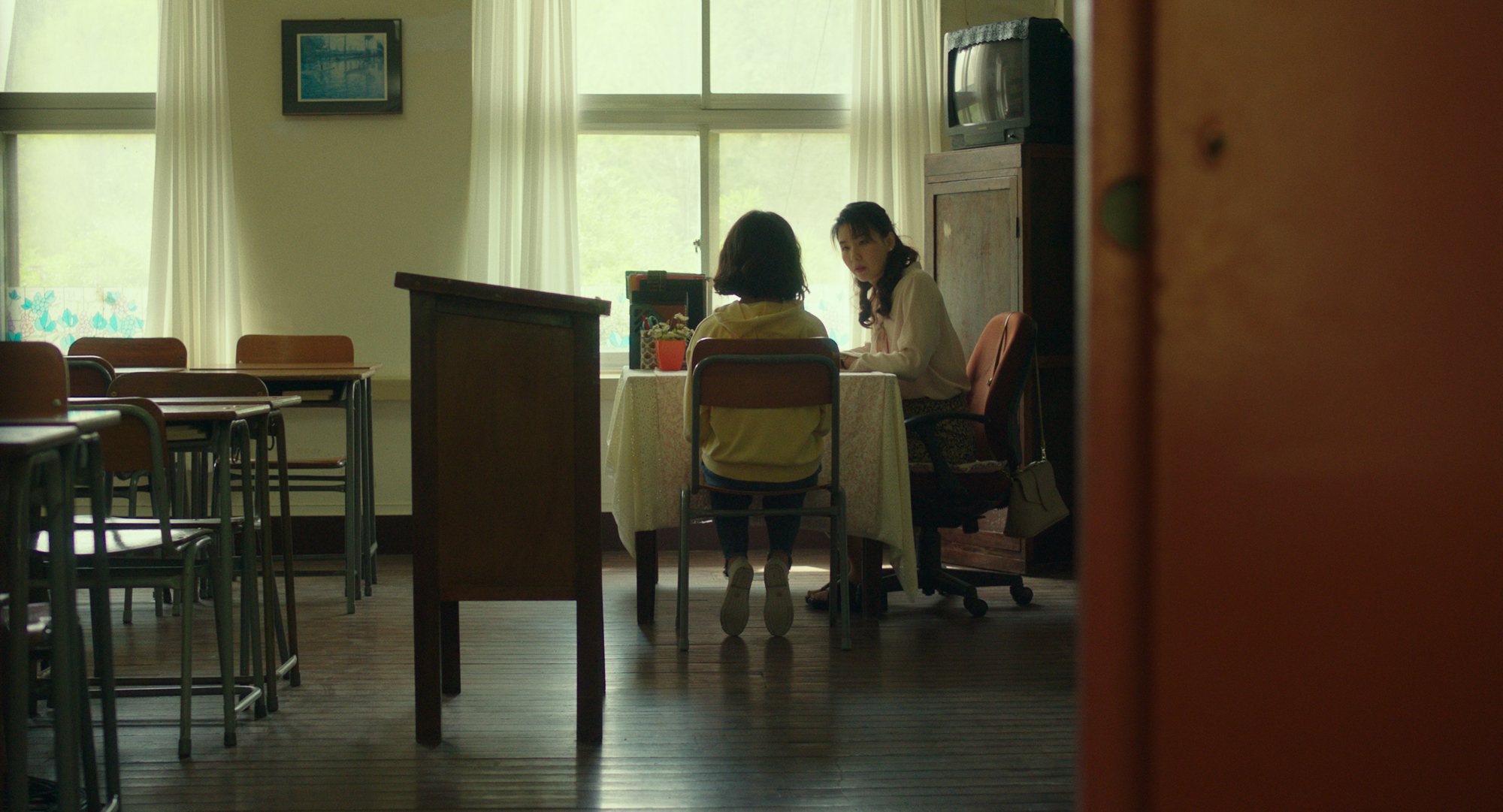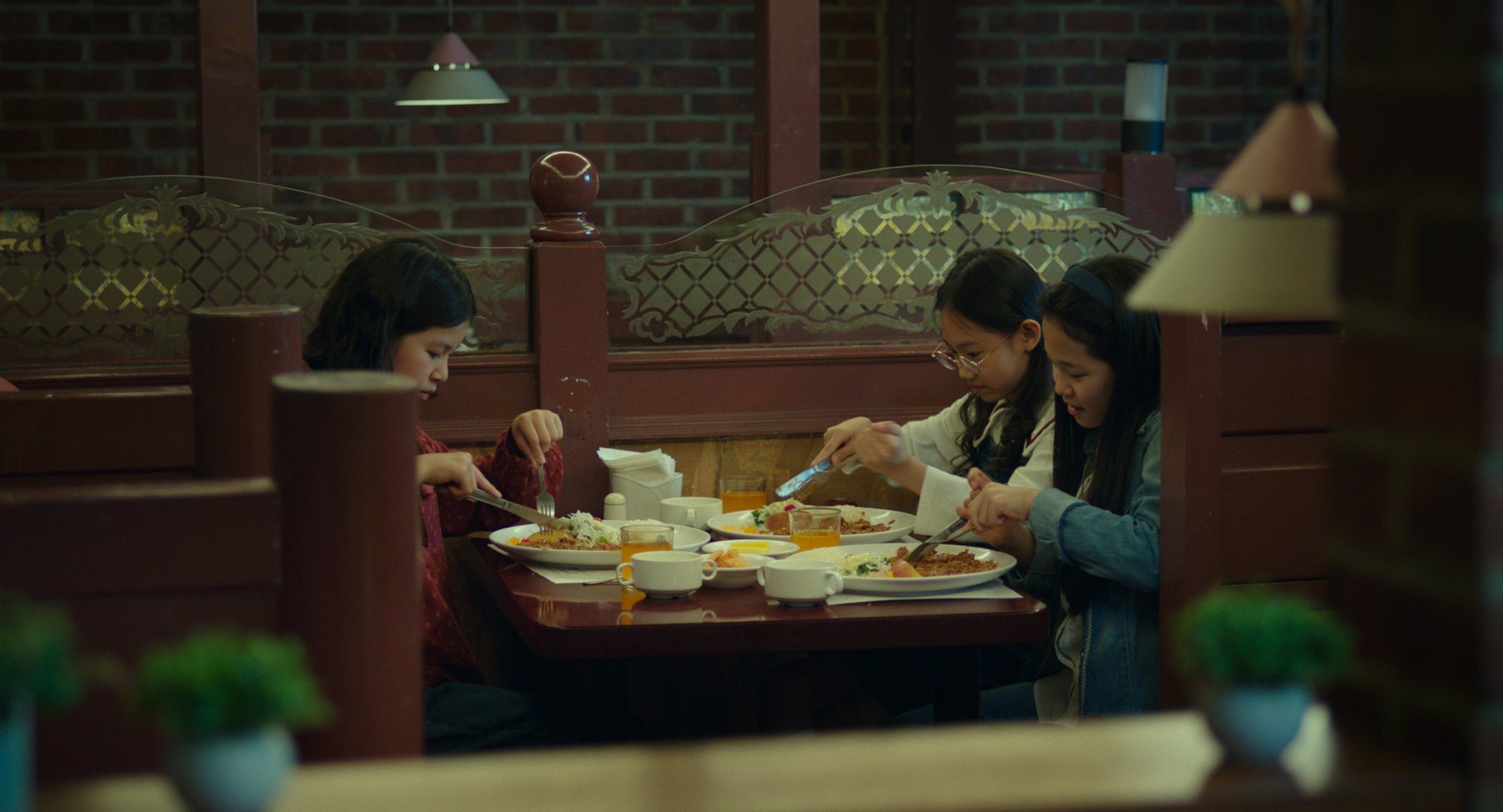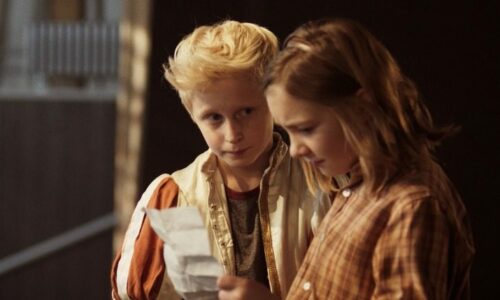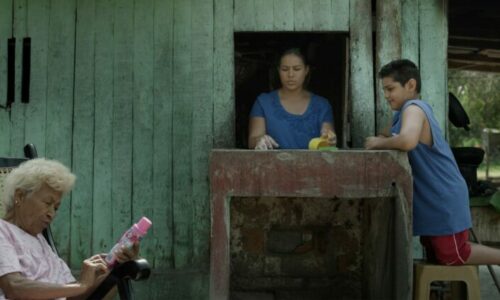Title: Bimileui eondeok | The Hill of Secrets | Hügel der Geheimnisse
Twelve-year-old Myung-eun (Moon Seung-a) is sitting at dinner with her brother and parents. They are having crab today. The TV is on in the background and there are reports about poorer people who can receive a donation with a phone call. When she asks her parents if she can call, her mother starts to get upset. They have worked hard for what they have now, and everyone else has these opportunities, and it is actually unnecessary to eat such an opulent meal, but her father wanted to cook something special.
Myung-eun is a completely different person, she believes in the good just about everywhere and that although her parents are perhaps not the best role models. In some ways, she is even embarrassed by them, since their work is rather unrepresentative by South Korean standards. Her mother owns a permanent fish stall at the market and her father works for his wife or rather lies down on the bench there and takes a nap.
When all the children at school have to report individually to the teacher (and thus to the entire class) what their parents do for a living, Myung-eun tries to avoid the interview. She had already written a letter to her teacher in advance, but it remained unread, much to Myung-eun’s chagrin, and her attempt to feign a headache in order to escape to the school infirmary backfired and only ensured that she would now have to report next. Out of the situation, she then invents a white lie and reports that her father works for a paper factory that makes exercise books, for example, and that her mother is a housewife (note from the Q&A: In the 1990s, it was still common for children to be questioned about their parents in front of the class, but today this no longer takes place). But now she has to maintain this instructed family situation somehow, so that the others don’t think anything wrong of her.

The approaching election for class president is of course a welcome opportunity and Myung-eun takes the initiative and can even win in the end by promising her classmates that she will read and implement all the written wishes and secrets that come into her wish box. From now on, she empties the box daily, always finding new pieces of paper that she goes through together with her teacher. The promised changes immediately begin in the class and from now on, for example, birthdays are celebrated together, a small library is set up, everyday life is recorded photographically, and so on. The class community literally blossoms, which even the school principal acknowledges favorably and in the end even praises the class teacher, who sells everything as her idea. But what nobody notices… Myung-eun wrote most of the notes herself. On the one hand, she loves to write and on the other hand, she is bubbling over with ideas and they are all very well received.
However, her euphoria is quickly curbed by envy when she comes to school one day and finds a gift on the teacher’s desk. Shortly thereafter, a classmate stands at the teacher’s desk and repeatedly engages in lengthy dialogues with the teacher. Said boy is also still class president and that he is now again and again with the teacher vorstellig and animatedly discusses, fits Myung-eun absolutely not in the stuff.
It even goes so far that she suffers an emotional breakdown from all her accumulated unrest in the class and announces that she no longer wants to continue her position as class president. However, her teacher is able to convince her otherwise and cleverly steers the girl towards participating in a writing competition. Myung-eun accepts the offer somewhat reluctantly, but then disappears behind piles of books to delve deeper into saving the earth. Here, too, she is quickly seized by the “helper syndrome” and from now on insists on meticulously separating the garbage at home, which, however, does not meet with much approval from her mother.
For her text she receives a silver certificate, with which she goes overjoyed to her parents to present this. For a moment, her parents are proud, but ultimately her father quickly devalues his daughter’s moment of happiness and says that Myung-eun shouldn’t just be satisfied with a silver certificate, she should have gotten a gold one. This grips her ambition, but this goal is hampered when a new classmate appears in class who, along with her sister, is new to the school. Her new classmate’s looks seem emotionless and it soon becomes clear that this is not the first change of school that these two girls have experienced. When asked what her parents’ occupation is, she answers succinctly that her father is deceased and her mother works as a prostitute. While the teacher’s features discreetly slip, a murmur goes through the class as to what a prostitute is.

To her delight, Myung-eun receives a second request for a writing contest, and as she is about to begin her research, she finds two other classmates in the library for the first time, the two newcomers. With a quick step, she passes them without a word, but she obviously already has a sense of foreboding.
When the prizes are announced, the two girls win the golden prize, and Myung-eun, seized by curiosity, now seeks contact with the two to find out how they did it with their text. The secret, they say, is to simply tell the truth, because that goes down well with the jury. Myung-eun wants to follow this advice and writes everything about her family and what she thinks of them for a competition that was announced for all schools in the country. She gets the highest prize and her win is even announced in the press, but what she didn’t realize is that her text will also be published in the newspaper after the ceremony. When she realizes that now really everyone can read her text, including her family, she pulls out all the stops to undo this award, because of course she does not want to expose her parents.
Conclusion:
The film had an incredible number of nuances in very different situations and to write all this in a review without telling the whole story was a real challenge with this work. I enjoyed every minute of this film to the fullest, because everything here was just coherent and entertaining. The director shows a lot of sensitivity with her chosen characters as well as the locations. The acting of Moon Seung-a as Myung-eun is remarkable, as her role is extremely versatile.
A clear favorite on my list for this year’s Berlinale.
Actors:
Moon Seung-a (Myung-eun)
Jang Sun (Kyung-hee)
Lim Sun-woo (Ae-ran)
Kang Gil-woo (Sung-ho)
Lee Dong-chan (Gi-nam)
Kwak Jin-moo (Jin-woo)
Jang Jae-hee (Hye-jin)
Moon Seo-hyeon (Ha-yan)
Choi Hyun-jin (Min-kyu)
Director:
Lee Ji-eun
About the movie:
https://www.berlinale.de/en/programme/programme/detail.html?film_id=202203673





